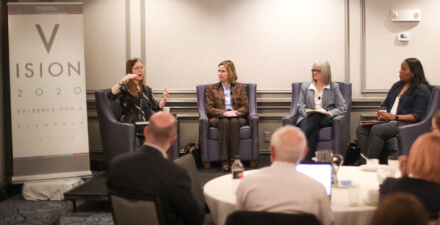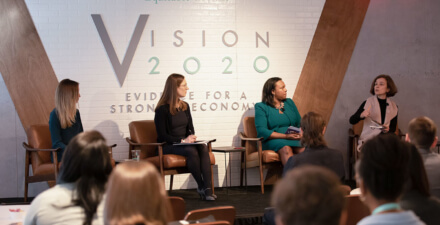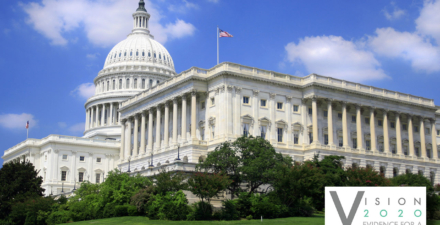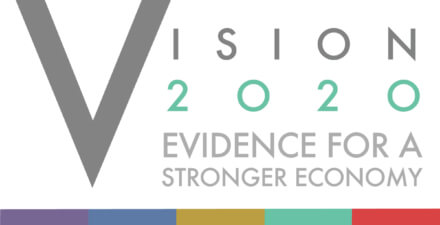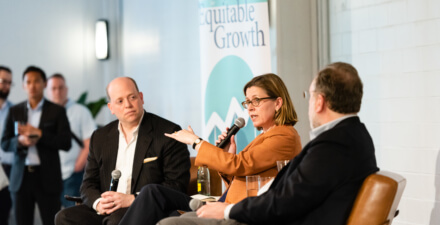Equitable Growth launches Vision 2020 book with discussion of research and policy ideas

The need for systemic change, the power of government to improve the U.S. economy and society, and the importance of connecting research, evidence, and data to the U.S. policymaking process dominated the conversation among a panel of scholars at the February 18 introduction of the Washington Center for Equitable Growth’s new policy book, Vision 2020: Evidence for a Stronger Economy.
The book presents 21 essays by leading academic economists and other social scientists containing innovative, evidence-based, and concrete policy ideas that are aimed at shaping the 2020 policy debate. They cover a wide range of issue areas, from tax and macroeconomics to racial and environmental justice, and from labor market reform to antitrust policies.
At the February 18 event, authors of four of the essays discussed their policy proposals: Robynn Cox, assistant professor of social work at the University of Southern California; Susan Lambert, professor of social service and administration at the University of Chicago; Fiona Scott Morton, professor of economics at Yale University, and Equitable Growth president and CEO Heather Boushey, who moderated the discussion.
Cox’s chapter, “Overcoming social exclusion: Addressing race and criminal justice policy in the United States,” calls for a number of actions, including:
- An audit of current federal crime-control policies and funding to determine what needs to be done to end mass incarceration and repair the criminal justice system
- The collection by state and local governments of unbiased data to understand the reasons for persistent racial disparities in criminal justice
- Incentives for states to repeal felon disenfranchisement laws
- A process of re-educating the American public about the history of race in the United States to “break flawed perceptions in the association between race and crime”
The first step in this process, she writes, should be reconciliation and atonement, which could address reparations for past and current oppressive policies. (Dania V. Francis writes separately about reparations in Vision 2020.)
At the book launch event, Cox noted that we “live in a society that has a dual criminal justice system in which individuals from different social groups are treated differently … We choose to punish differently based on who is committing the crime.” She added, “That seems to be based on age-old perceptions … about race and crime. One can view crime as a symptom of poverty, or you can say individuals have innate criminality and they’re committing crimes because of this innate criminality.”
Cox also explained that “colorblind” policies, whether relating to criminal justice or other policy areas, are not the same as “race-neutral” policies. “We’ve created policies that have been seemingly colorblind, but they have not been implemented in a race-neutral way,” she said, “either because they disproportionately seem to impact certain groups, which then continues to drive disparities and inequality, or because their actual implementation has been biased.”
She concluded, “When we’re making policies, we really have to consider not only this colorblind notion, that this policy is going to help the poor, but is it going to help the most marginalized groups in society? How does it impact racial disparities?”
To learn moreabout Cox’s Vision 2020 essay, see this Equitable Growth video:
Lambert’s contribution, “Fair work schedules for the U.S. economy and society: What’s reasonable, feasible, and effective,” addresses the problems of work schedule instability and unpredictability. Too many workers, especially low-income workers, are subject to employers setting and changing work schedules with insufficient notice, making it difficult to arrange childcare and healthcare, hold second jobs, and predict household earnings from week to week and month to month. Oregon and several U.S. cities have passed comprehensive scheduling laws that, generally, provide workers with two weeks’ notice of their schedules and a good-faith estimate of their hours, as well as greater say over their shifts and protection from arbitrary last-minute schedule changes. Lambert urges the federal government to consider national legislation based on the evidence of how well these and future local and state rules work.
At the February 18 session, Lambert noted the disproportionate impact of scheduling problems. “The most disadvantaged workers,” she said, “experience a constellation of problematic scheduling practices. For example, lower-paid workers, and African American workers compared to white workers, are at significantly higher risk of experiencing what we call the ‘triple whammy’ of having work-hour volatility plus short advance notice plus no say in when you work.”
She also addressed new technologies that enable employers to use algorithms to set schedules for efficiency. She said the new software “is a tool and not the cause of this instability and unpredictability.” But she added that the algorithms “can be used to provide stable and predictable schedules” and that some companies are, in fact, using the software that way.
For more on Lambert’s essay, see this video:
Scott Morton’s essay, “Reforming U.S. antitrust enforcement and competition policy,” lays out the data showing increasing corporate mergers and anticompetitive activity that have led to rising concentration in the U.S. economy and points out why and how antitrust laws are being underenforced. She proposes a number of changes to begin to correct the problem:
- She calls on Congress to approximately double the budgets of the Antitrust Division of the Justice Department and the Federal Trade Commission to allow for greater enforcement activities, noting that resources for enforcement have declined significantly since 2000, that the number of enforcement actions has declined, and that firms have been able to raise prices above marginal costs with greater frequency, signaling noncompetitive markets.
- She urges the appointment of leaders of the two enforcement agencies who are prepared to use existing authority to toughen enforcement of the antitrust laws and bring challenging cases to the courts.
- She calls on Congress to reform antitrust statutes to guide the courts more closely and thus deter and prevent anticompetitive conduct more effectively, pointing to increasingly pro-business court decisions based on loose interpretations of existing law. Such changes would:
- Overturn Supreme Court precedent that has permitted anticompetitive behavior on a large scale
- Prohibit courts from avoiding examination of the evidence in a case and just assuming that a market is or will become competitive
- Create simple rules (presumptions) that deter practices that, based on existing evidence, are likely to be anticompetitive
- Clarify that antitrust violations can result in not only higher prices but also reduced quality, harm to innovation, lower wages, and elimination of potential competition
- She urges creation of a new federal agency to regulate digital businesses that could take such actions as establishing standards for a competitive digital marketplace and considering whether consumers should be able to coordinate their use of social media applications or commerce websites (known as interoperability).
At the Equitable Growth event, Scott Morton decried the inability or unwillingness of federal judges to consider empirical economic evidence in their antitrust decision-making rather than relying solely on what she considers to be outdated antitrust theory and legal interpretations.
“We know a lot more about how markets work,” she said. “That progress has not translated into the courts, so not only are we enforcing less because of the push to make the judiciary believe that antitrust enforcement is not a good idea, but also we’re not giving courts the tools to enforce well, or when we give the courts those tools, they’re rejecting them and saying they’re too hard, we can’t do economics … Then, you’re throwing darts rather than using scientific tools to figure out whether consumers will be harmed.”
She said one possible reason for judges finding it too difficult to use economic analysis is that most do not get a lot of antitrust cases because of the randomness of how judges are selected for cases. She suggested the creation of a specialized trial court, made up of judges with some economic expertise, to hear cases brought under the federal antitrust laws.
To learn more about Scott Morton’s research, see the following video:
Heather Boushey noted on several occasions the reliance of policy proposals on newly available data, as well as the need for more going forward. In her Vision 2020 essay, “New measurement for a new economy,” she argues for the importance of new metrics in an age of inequality to show whether the U.S. economy is delivering benefits for all Americans. She points to GDP 2.0, an Equitable Growth initiative that urges policymakers to use data to show how the benefits of economic growth are distributed up and down the income ladder.
At the book release event, she also made a connection between data and the other issues discussed by panelists. “You can only analyze things for which you have data and that you know,” she said, “so if you have a set of policies, you know whether or not they were effective. But you don’t know anything about the policies that don’t exist or trends that you aren’t tracking. And so these questions about what kinds of data government should be creating, what kinds of data we could be using from the private sector, are imperative not just for evaluating failures of current policies but for knowing more, which is something that we really want to focus on a lot at Equitable Growth.”
Equitable Growth plans to distribute Vision 2020 to policymakers and others in the hope that its 21 essays can both contribute to the current policy debate and spur action on these critical issues in the coming months and years.


